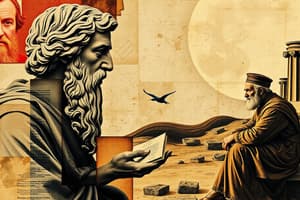Podcast
Questions and Answers
What is the central idea of Augustine's philosophy regarding man's existence?
What is the central idea of Augustine's philosophy regarding man's existence?
- Man is perfect and does not need a relationship with God.
- The understanding of self is rooted in doubt and questioning. (correct)
- Man exists solely in the physical world without spiritual implications.
- Only the body has significance in understanding human existence.
Which statement reflects Descartes' view on the relationship between mind and body?
Which statement reflects Descartes' view on the relationship between mind and body?
- Doubting is irrelevant to the understanding of the self.
- Mind and body are inseparably linked and identical in function.
- The mind is where true understanding and perception of existence originate. (correct)
- The body is superior to the mind in understanding existence.
What does Augustine mean by saying that man has a 'bifurcated nature'?
What does Augustine mean by saying that man has a 'bifurcated nature'?
- Man is entirely focused on worldly pursuits.
- Man is both a physical being and a spiritual being that yearns for God. (correct)
- Man cannot separate his physical existence from his spiritual beliefs.
- Man only experiences spiritual bliss during moments of doubt.
How does Augustine propose that everything will improve for man?
How does Augustine propose that everything will improve for man?
What is the significance of Descartes' statement 'I think, therefore I am'?
What is the significance of Descartes' statement 'I think, therefore I am'?
What does the term 'philosophy' signify?
What does the term 'philosophy' signify?
Which of the following is a principal idea in Socrates' philosophy?
Which of the following is a principal idea in Socrates' philosophy?
What does the Socratic method primarily involve?
What does the Socratic method primarily involve?
According to Plato, what aspect of a person is important for understanding their behavior?
According to Plato, what aspect of a person is important for understanding their behavior?
What motivates human choice according to Socrates?
What motivates human choice according to Socrates?
What does Plato categorize as the 'spirited soul'?
What does Plato categorize as the 'spirited soul'?
How did Socrates view the examined life?
How did Socrates view the examined life?
What is one belief that Socrates and Plato share?
What is one belief that Socrates and Plato share?
Study Notes
What is Philosophy?
- Originates from Greek words "philos" (love) and "sophia" (wisdom).
- Philosophers are individuals who seek wisdom, emphasizing clear, precise, and systematic thinking.
- Deals with fundamental concerns of existence, including presence, information, values, reason, psyche, and dialect.
Socrates (470-399 BC)
- Considered a foundational figure in Western philosophy, known as the Father of Western Philosophy.
- Focused on self-knowledge; believed true happiness stems from understanding oneself.
- Suggested that human actions are motivated by the pursuit of happiness, guiding choices to avoid negative repercussions.
- Advocated for knowledge as a virtue; ignorance equated to depravity.
- Famous for the aphorism: “The unexamined life is not worth living.”
- Introduced the Socratic Method, a form of inquiry that fosters critical thinking by responding to questions with further questions.
Plato (428-348 BC)
- A student of Socrates who expanded on philosophical ideas, particularly regarding the soul's nature.
- Proposed a duality of body and soul, suggesting that one's identity transcends material existence.
- Divided the soul into three parts:
- Appetitive Soul: Driven by desires and physical needs (e.g., food, pleasure).
- Spirited Soul: Associated with courage and ambition, motivating individuals to right wrongs and achieve success.
- Rational Soul: The rational part that plans, decides, and considers the consequences of actions.
St. Augustine
- A saint and philosopher who blended Platonic philosophy with Christian theology.
- Believed self-reflection and questioning are fundamental to understanding one's existence.
- Associated human nature with the divine, suggesting we yearn for godliness while living in an imperfect world.
- Proposed a bifurcation of man: a part existing in a flawed world and another aspiring for spiritual immortality with God.
- Emphasized that life improves with devotion to God, positing that our relationship with the divine is essential for fulfillment.
René Descartes (1596-1650)
- Known as the Father of Modern Philosophy; established a dualistic view of the human experience, differentiating between body and mind.
- Championed methodical doubt as a vital process for discerning truth; encouraged continuous questioning of perceptions.
- Asserted that while the body perceives through senses, those perceptions can be misleading, thus advocating for focusing on the mind to grasp the essence of existence.
- Famous for the statement: "I think, therefore I am," emphasizing the role of thought in defining self-identity.
- Identified the mind as the essence of being, while the body is regarded as a machine that operates under the mind's influence.
Studying That Suits You
Use AI to generate personalized quizzes and flashcards to suit your learning preferences.
Description
Explore the fundamental concepts of philosophy, including its origins and key figures such as Socrates and Plato. Delve into the importance of self-knowledge and the Socratic Method in fostering critical thinking. This quiz covers the essential ideas that have shaped Western philosophy.




